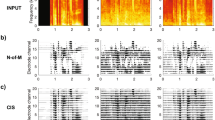Abstract
Older adults understand speech with comparative ease in quiet, but signal degradation can hinder speech understanding much more than it does in younger adults. This difficulty may result, in part, from temporal processing deficits related to the aging process and/or high-frequency hearing loss that can occur in listeners who have normal- or near-normal-hearing thresholds in the speech frequency range. Temporal processing deficits may manifest as degraded neural representation in peripheral and brainstem/midbrain structures that lead to compensation, or changes in response strength in auditory cortex. Little is understood about the process by which the neural representation of signals is improved or restored by age-related cortical compensation mechanisms. Therefore, we used vocoding to simulate spectral degradation to compare the behavioral and neural representation of words that contrast on a temporal dimension. Specifically, we used the closure duration of the silent interval between the vowel and the final affricate /t∫/ or fricative /ʃ/ of the words DITCH and DISH, respectively. We obtained perceptual identification functions and electrophysiological neural measures (frequency-following responses (FFR) and cortical auditory-evoked potentials (CAEPs)) to unprocessed and vocoded versions of these words in young normal-hearing (YNH), older normal- or near-normal-hearing (ONH), and older hearing-impaired (OHI) listeners. We found that vocoding significantly reduced the slope of the perceptual identification function in only the OHI listeners. In contrast to the limited effects of vocoding on perceptual performance, vocoding had robust effects on the FFRs across age groups, such that stimulus-to-response correlations and envelope magnitudes were significantly lower for vocoded vs. unprocessed conditions. Increases in the P1 peak amplitude for vocoded stimuli were found for both ONH and OHI listeners, but not for the YNH listeners. These results suggest that while vocoding substantially degrades early neural representation of speech stimuli in the midbrain, there may be cortical compensation in older listeners that is not seen in younger listeners.











Similar content being viewed by others
References
Ananthakrishnan S, Luo X, Krishnan A (2017) Human frequency following responses to vocoded speech. Ear Hear 38:e256–e267. https://doi.org/10.1097/aud.0000000000000432
Anderson S, Ellis R, Mehta J, Goupell MJ (2018) Age-related differences in binaural masking level differences: behavioral and electrophysiological evidence. J Neurophysiol 120:2939–2952. https://doi.org/10.1152/jn.00255.2018
Benjamini Y, Hochberg Y (1995) Controlling the false discovery rate: a practical and powerful approach to multiple testing. J R Stat Soc Ser B Stat Methodol 57:289–300 https://www.jstor.org/stable/2346101
Bidelman GM, Moreno S, Alain C (2013) Tracing the emergence of categorical speech perception in the human auditory system. NeuroImage 79:201–212. https://doi.org/10.1016/j.neuroimage.2013.04.093
Billings CJ, Penman TM, McMillan GP, Ellis EM (2015) Electrophysiology and perception of speech in noise in older listeners: effects of hearing impairment and age. Ear Hear 36:710–722. https://doi.org/10.1097/aud.0000000000000191
Blamey P, Artieres F, Baskent D, Bergeron F, Beynon A, Burke E, Dillier N, Dowell R, Fraysse B, Gallégo S, Govaerts PJ, Green K, Huber AM, Kleine-Punte A, Maat B, Marx M, Mawman D, Mosnier I, O’Connor AF, O’Leary S, Rousset A, Schauwers K, Skarzynski H, Skarzynski PH, Sterkers O, Terranti A, Truy E, van de Heyning P, Venail F, Vincent C, Lazard DS (2013) Factors affecting auditory performance of postlinguistically deaf adults using cochlear implants: an update with 2251 patients. Audiol Neurootol 18:36–47. https://doi.org/10.1159/000343189
Brodbeck C, Presacco A, Anderson S, Simon JZ (2018) Over-representation of speech in older adults originates from early response in higher order auditory cortex. Acta Acust United Acust 104:774–777. https://doi.org/10.3813/AAA.919221
Caspary DM, Schatteman TA, Hughes LF (2005) Age-related changes in the inhibitory response properties of dorsal cochlear nucleus output neurons: role of inhibitory inputs. J Neurosci 25:10952–10959. https://doi.org/10.1523/jneurosci.2451-05.2005
Ceponiene R, Alku P, Westerfield M, Torki M, Townsend J (2005) ERPs differentiate syllable and nonphonetic sound processing in children and adults. Psychophysiology 42:391–406. https://doi.org/10.1111/j.1469-8986.2005.00305.x
Chambers AR, Resnik J, Yuan Y, Whitton JP, Edge AS, Liberman MC, Polley DB (2016) Central gain restores auditory processing following near-complete cochlear denervation. Neuron 89:867–879. https://doi.org/10.1016/j.neuron.2015.12.041
de Cheveigne A, Simon JZ (2008) Denoising based on spatial filtering. J Neurosci Methods 171:331–339. https://doi.org/10.1016/j.jneumeth.2008.03.015
Decruy L, Vanthornhout J, Francart T (2019) Evidence for enhanced neural tracking of the speech envelope underlying age-related speech-in-noise difficulties. J Neurophysiol 122:601–615. https://doi.org/10.1152/jn.00687.2018
Delorme A, Makeig S (2004) EEGLAB: an open source toolbox for analysis of single-trial EEG dynamics including independent component analysis. J Neurosci Methods 134:9–21. https://doi.org/10.1016/j.jneumeth.2003.10.009
Dong S, Mulders W, Rodger J, Robertson D (2009) Changes in neuronal activity and gene expression in guinea-pig auditory brainstem after unilateral partial hearing loss. Neuroscience 159:1164–1174. https://doi.org/10.1016/j.neuroscience.2009.01.043
Florentine M, Buus S, Scharf B, Zwicker E (1980) Frequency selectivity in normally-hearing and hearing-impaired observers. J Speech Lang Hear Res 23:646–669. https://doi.org/10.1044/jshr.2303.646
Friesen LM, Tremblay KL, Rohila N, Wright RA, Shannon RV, Baskent D, Rubinstein JT (2009) Evoked cortical activity and speech recognition as a function of the number of simulated cochlear implant channels. Clin Neurophysiol 120:776–782. https://doi.org/10.1016/j.clinph.2009.01.008
Gordon-Salant S, Fitzgibbons PJ (1993) Temporal factors and speech recognition performance in young and elderly listeners. J Speech Hear Res 36:1276–1285. https://doi.org/10.1044/jshr.3606.1276
Gordon-Salant S, Fitzgibbons PJ, Friedman SA (2007) Recognition of time-compressed and natural speech with selective temporal enhancements by young and elderly listeners. J Speech Lang Hear Res 50:1181–1193. https://doi.org/10.1044/1092-4388(2007/082)
Gordon-Salant S, Yeni-Komshian G, Fitzgibbons P (2008) The role of temporal cues in word identification by younger and older adults: effects of sentence context. J Acoust Soc Am 124:3249–3260. https://doi.org/10.1121/1.2982409
Gordon-Salant S, Fitzgibbons PJ, Yeni-Komshian GHAR (2011) Auditory temporal processing and aging: implications for speech understanding of older people. Audiol Res 1:e4–e4. https://doi.org/10.4081/audiores.2011.e4
Gordon-Salant S, Yeni-Komshian GH, Fitzgibbons PJ, Barrett J (2006) Age-related differences in identification and discrimination of temporal cues in speech segments. J Acoust Soc Am 119:2455–2466. https://doi.org/10.1121/1.2171527
Gosselin PA, Gagne JP (2011) Older adults expend more listening effort than young adults recognizing audiovisual speech in noise. Int J Audiol 50:786–792. https://doi.org/10.3109/14992027.2011.599870
Goupell MJ, Gaskins CR, Shader MJ, Walter EP, Anderson S, Gordon-Salant S (2017) Age-related differences in the processing of temporal envelope and spectral cues in a speech segment. Ear Hear 38:e335–e342. https://doi.org/10.1097/aud.0000000000000447
Hughes LF, Turner JG, Parrish JL, Caspary DM (2010) Processing of broadband stimuli across A1 layers in young and aged rats. Hear Res 264:79–85. https://doi.org/10.1016/j.heares.2009.09.005
JASP (2018) JASP Team. In, 0.9 Edition
Kotak VC, Fujisawa S, Lee FA, Karthikeyan O, Aoki C, Sanes DH (2005) Hearing loss raises excitability in the auditory cortex. J Neurosci 25:3908–3918. https://doi.org/10.1523/jneurosci.5169-04.2005
Kraus N, Bradlow MA, Cunningham CJ, King CD, Koch DB, Nicol TG, McGee TJ, Stein LK, Wright BA (2000) Consequences of neural asynchrony: a case of AN. J Assoc Res Otolaryngol 01:33–45. https://doi.org/10.1007/s101620010004
Mamo SK, Grose JH, Buss E (2016) Speech-evoked ABR: effects of age and simulated neural temporal jitter. Hear Res 333:201–209. https://doi.org/10.1016/j.heares.2015.09.005
Morrell CH, Gordon-Salant S, Pearson JD, Brant LJ, Fozard JL (1996) Age- and gender-specific reference ranges for hearing level and longitudinal changes in hearing level. J Acoust Soc Am 100:1949–1967. https://doi.org/10.1121/1.417906
Nasreddine ZS, Phillips NA, Bédirian V, Charbonneau S, Whitehead V, Collin I, Cummings JL, Chertkow H (2005) The Montreal Cognitive Assessment, MoCA: a brief screening tool for mild cognitive impairment. J Am Geriatr Soc 53:695–699. https://doi.org/10.1111/j.1532-5415.2005.53221.x
Parthasarathy A, Bartlett EL (2011) Age-related auditory deficits in temporal processing in F-344 rats. Neuroscience 192:619–630. https://doi.org/10.1016/j.neuroscience.2011.06.042
Parthasarathy A, Bartlett EL, Kujawa SG (2018) Age-related changes in neural coding of envelope cues: peripheral declines and central compensation. Neuroscience 407:21–31. https://doi.org/10.1016/j.neuroscience.2018.12.007
Phillips SL, Gordon-Salant S, Fitzgibbons PJ, Yeni-Komshian G (2000) Frequency and temporal resolution in elderly listeners with good and poor word recognition. J Speech Lang Hear Res 43:217–228. https://doi.org/10.1044/jslhr.4301.217
Pichora-Fuller MK, Schneider BA, MacDonald E, Pass HE, Brown S (2007) Temporal jitter disrupts speech intelligibility: a simulation of auditory aging. Hear Res 223:114–121. https://doi.org/10.1016/j.heares.2006.10.009
Presacco A, Simon JZ, Anderson S (2016a) Evidence of degraded representation of speech in noise, in the aging midbrain and cortex. J Neurophysiol 116:2346–2355. https://doi.org/10.1152/jn.00372.2016
Presacco A, Simon JZ, Anderson S (2016b) Effect of informational content of noise on speech representation in the aging midbrain and cortex. J Neurophysiol 116:2356–2367. https://doi.org/10.1152/jn.00373.2016
Presacco A, Simon JZ, Anderson S (2019) Speech-in-noise representation in the aging midbrain and cortex: effects of hearing loss. PLoS One 14:e0213899. https://doi.org/10.1371/journal.pone.0213899
Presacco A, Jenkins K, Lieberman R, Anderson S (2015) Effects of aging on the encoding of dynamic and static components of speech. Ear Hear 36:e352–e363. https://doi.org/10.1097/aud.0000000000000193
Reuter-Lorenz PA, Cappell KA (2008) Neurocognitive aging and the compensation hypothesis. Curr Dir Psychol Sci 17:177–182. https://doi.org/10.1111/j.1467-8721.2008.00570.x
Romero S, Mananas MA, Barbanoj MJ (2006) Quantitative evaluation of automatic ocular removal from simulated EEG signals: regression vs. second order statistics methods. Conf Proc IEEE Eng Med Biol Soc 1:5495–5498. https://doi.org/10.1109/iembs.2006.260338
Roque L, Gaskins C, Gordon-Salant S, Goupell MJ, Anderson S (2019) Age effects on neural representation and perception of silence duration cues in speech. J Speech Lang Hear Res 62:1099–1116. https://doi.org/10.1044/2018_jslhr-h-ascc7-18-0076
Ross B, Jamali S, Tremblay KL (2013) Plasticity in neuromagnetic cortical responses suggests enhanced auditory object representation. BMC Neruosci 14:151. https://doi.org/10.1186/1471-2202-14-151
Särelä J, Valpola H (2005) Denoising source separation. J Mach Learn Res 6:233–272
Schlögl A, Keinrath C, Zimmermann D, Scherer R, Leeb R, Pfurtscheller G (2007) A fully automated correction method of EOG artifacts in EEG recordings. Clin Neurophysiol 118:98–104. https://doi.org/10.1016/j.clinph.2006.09.003
Schvartz KC, Chatterjee M, Gordon-Salant S (2008) Recognition of spectrally degraded phonemes by younger, middle-aged, and older normal-hearing listeners. J Acoust Soc Am 124:3972–3988. https://doi.org/10.1121/1.2997434
Sheldon S, Pichora-Fuller MK, Schneider BA (2008) Effect of age, presentation method, and learning on identification of noise-vocoded words. J Acoust Soc Am 123:476–488. https://doi.org/10.1121/1.2805676
Sladen DP, Zappler A (2015) Older and younger adult cochlear implant users: speech recognition in quiet and noise, quality of life, and music perception. Am J Audiol 24:31–39. https://doi.org/10.1044/2014_aja-13-0066
Tremblay K, Piskosz M, Souza P (2003) Effects of age and age-related hearing loss on the neural representation of speech cues. Clin Neurophysiol 114:1332–1343. https://doi.org/10.1016/S1388-2457(03)00114-7
Tun PA, McCoy S, Wingfield A, Aging (2009) Aging, hearing acuity, and the attentional costs of effortful listening. Psychol Aging 24:761–766. https://doi.org/10.1037/a0014802
Wichmann FA, Hill NJ (2001) The psychometric function: I. Fitting, sampling, and goodness of fit. Percept Psychophys 63:1293–1313. https://doi.org/10.3758/BF03194544
Zhu J, Garcia E (1999) The Wechsler Abbreviated Scale of Intelligence (WASI). Psychological Corporation, New York
Acknowledgments
The authors wish to thank Calli Fodor and Erin Walter for their assistance with data collection and analysis.
Funding
This study was supported by the National Institute on Deafness and Other Communication Disorders of the National Institutes of Health (NIH) under award number R21DC015843 (Anderson) and the National Institute on Aging under award number R01AG051603 (Goupell). The content is solely the responsibility of the authors and does not necessarily represent the official views of the National Institutes of Health.
Author information
Authors and Affiliations
Corresponding author
Ethics declarations
Conflict of Interest
The authors declare that they have no conflicts of interest.
Additional information
Publisher’s Note
Springer Nature remains neutral with regard to jurisdictional claims in published maps and institutional affiliations.
Rights and permissions
About this article
Cite this article
Anderson, S., Roque, L., Gaskins, C.R. et al. Age-Related Compensation Mechanism Revealed in the Cortical Representation of Degraded Speech. JARO 21, 373–391 (2020). https://doi.org/10.1007/s10162-020-00753-4
Received:
Accepted:
Published:
Issue Date:
DOI: https://doi.org/10.1007/s10162-020-00753-4




